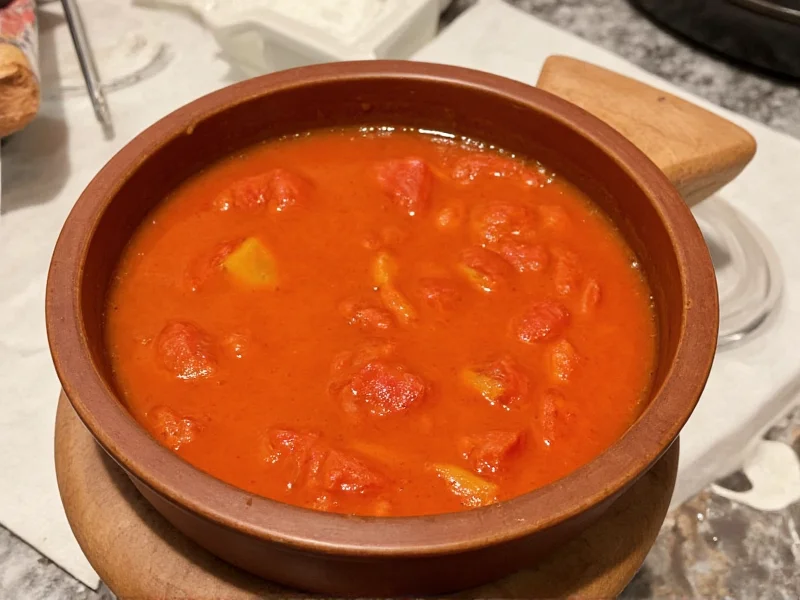Creating exceptional tomato soup using tomato sauce is simpler than most home cooks realize. Unlike recipes demanding fresh tomatoes or tomato paste, this approach leverages the consistent flavor and convenient nature of canned tomato sauce while implementing professional techniques to elevate the final product. The key lies in understanding how to balance acidity, develop flavor layers, and achieve that coveted creamy texture without relying heavily on dairy.
The Essential Tomato Soup Recipe Using Tomato Sauce
This streamlined recipe produces four generous servings of velvety tomato soup with pantry staples. Total preparation and cooking time: 30 minutes.
| Ingredient | Measurement | Key Purpose |
|---|---|---|
| Tomato sauce (not paste) | 28 oz (800g) can | Base flavor and body |
| Vegetable or chicken broth | 2 cups (480ml) | Thins consistency and adds depth |
| Yellow onion, finely diced | 1 medium | Sweetness and aromatic foundation |
| Garlic cloves, minced | 3 | Flavor complexity |
| Olive oil or butter | 2 tbsp | Sauté medium and richness |
| Sugar | 1 tsp | Balances acidity |
| Dried basil | 1 tsp | Herbal notes |
| Heavy cream or coconut milk | ¼ cup (60ml) | Creaminess (optional) |
| Salt and black pepper | To taste | Seasoning |
Step-by-Step Preparation
- Sauté aromatics: Heat olive oil in a medium pot over medium heat. Add diced onion and cook until translucent (5-7 minutes), stirring occasionally. Add minced garlic during the last minute to prevent burning.
- Build flavor foundation: Pour in tomato sauce and broth while scraping the bottom of the pot to incorporate any caramelized bits. Stir in dried basil, sugar, salt, and pepper.
- Simmer for depth: Bring mixture to a gentle simmer, then reduce heat to low. Cover and cook for 15-20 minutes to allow flavors to meld. Stir occasionally.
- Blend to perfection: Using an immersion blender, puree soup until completely smooth. For traditional blenders, cool slightly and blend in batches with caution.
- Finish with creaminess: Stir in heavy cream or coconut milk if desired. Adjust seasoning with additional salt, pepper, or a splash of balsamic vinegar for brightness.
- Serve immediately: Ladle into bowls and garnish with fresh basil, a drizzle of cream, or croutons.
Why Tomato Sauce Works Better Than You Think
Many home cooks mistakenly believe fresh tomatoes or tomato paste are superior for making tomato soup using tomato sauce, but quality canned tomato sauce offers distinct advantages. Modern commercial tomato sauce undergoes controlled cooking during production, developing complex flavor compounds through the Maillard reaction that would take hours to achieve at home. This easy tomato soup recipe with tomato sauce capitalizes on that pre-developed flavor foundation.
The critical technique for exceptional results involves proper acid balance. Tomato sauce typically has a pH between 4.1-4.6, which can taste overly sharp when made into soup. The small amount of sugar in our recipe doesn't make the soup sweet—it neutralizes harsh acidity while preserving tomato flavor. For even better results, add a splash of balsamic vinegar at the end rather than more sugar, as its complex acids complement rather than mask tomato flavor.
Avoiding Common Tomato Soup Mistakes
When preparing how to make tomato soup from canned tomato sauce, three pitfalls frequently ruin otherwise good attempts:
- Skipping the simmer step: Rushing this 15-20 minute simmer prevents flavor integration. The soup will taste like "heated-up sauce" rather than a cohesive dish.
- Over-reducing: Many cooks evaporate too much liquid trying to thicken the soup, concentrating unpleasant metallic notes from the can. Use a roux or cashew cream for thickening instead.
- Adding dairy too early: Introducing cream before finishing cooking can cause separation. Always temper dairy by adding a small amount of hot soup first.
Variations for Different Dietary Needs
This quick tomato soup using pantry ingredients adapts beautifully to various preferences:
- Vegan version: Substitute olive oil for butter and coconut milk for cream. Add 2 tbsp nutritional yeast for umami depth.
- Spicy arrabbiata style: Include ½ tsp red pepper flakes with the garlic and finish with fresh parsley.
- Protein boost: Stir in 1 cup cooked white beans or shredded chicken during the last 5 minutes of cooking.
- Smoky variation: Add ½ tsp smoked paprika with the dried basil for a subtle campfire note.
Storage and Reheating Guidelines
Proper storage maintains quality for this homemade tomato soup using tomato sauce. Cool completely before transferring to airtight containers. Refrigerated soup stays fresh for 4-5 days. For longer storage, freeze in portion-sized containers for up to 3 months.
When reheating, do so gently over medium-low heat while stirring frequently. If the soup has separated, an immersion blender for 10-15 seconds will restore smoothness. Never boil reheated tomato soup, as this degrades texture and flavor. For frozen portions, thaw overnight in the refrigerator before reheating.
Choosing the Best Tomato Sauce
Not all tomato sauces work equally well for tomato soup recipe with tomato sauce and broth. Avoid sauces with added herbs, spices, or sugar beyond salt. Look for "no salt added" varieties if you prefer complete seasoning control. Premium brands like Bianco DiNapoli or Pomi offer cleaner flavor profiles ideal for soup bases. In a pinch, substitute two 15-ounce cans of tomato sauce for one 28-ounce can.











 浙公网安备
33010002000092号
浙公网安备
33010002000092号 浙B2-20120091-4
浙B2-20120091-4